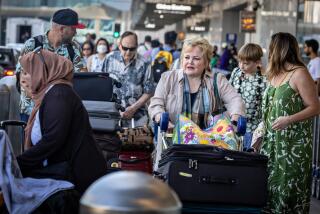White House defends body scanners and pat-downs
- Share via
Reporting from Washington — The White House on Monday defended the use of body scanners and aggressive pat-downs to screen air travelers as necessary against current terror threats as officials sought to quell a firestorm of complaints before the busy Thanksgiving travel weekend.
Yet even as it stood by the new policies, White House Press Secretary Robert Gibbs said, the Obama administration constantly is reevaluating security techniques, saying they “have to evolve.”
“Our goal must to be maximize protection and security and minimize inconvenience and invasiveness,” Gibbs said, adding, “It’s not an easy task.”
Speaking with reporters on Monday morning, TSA administrator John Pistole expressed his “willingness to assess our current screening as part of an ever-evolving security plan.”
“I recognize we do things in a partnership with the American people,” he said.
The stepped-up security measures were launched 17 days ago and were attacked immediately by critics who argue the procedures are an unnecessary violation of privacy. A handful of videos on YouTube of passengers subjected to the pat-downs, which include TSA agents using their open hands to search the clothed genital areas of passengers, have drawn huge web traffic, further escalating controversy.
On Wednesday, the day before Thanksgiving, a grassroots protest movement seeks to create long delays in airport security lines by asking air travelers to “opt out” of advanced full-body imaging machines. Transportation Security Administration officials said they will have extra workers on duty to deal with any slowdowns.
Federal officials have started to answer critics with statistics they say show most passengers see enhanced screening as a necessary inconvenience. The handful of web videos do not put the new techniques in proper context, they say.
The Department of Homeland Security said that of the estimated 28 million people who flew during the first two weeks of the new security measures, TSA received fewer than 700 complaints. Of all the passengers who were asked to submit to a full body scan, only 1% have chosen to opt out and instead undergo a pat-down.
Federal officials have emphasized that most passengers will continue to pass only through metal detectors. A smaller group will be asked to submit to a body scan. But only passengers who refuse the body scan or trip the alarm on the metal detector will be asked to agree to a pat-down.
TSA agents also have the discretion to allow passengers who trip the metal detector to check again for any metal on them and pass through the detector again — instead of being subjected to a pat-down — and the practice is common.
The TSA released its own public service announcement today with advice for travelers, emphasizing that the pat-downs are rare and that travelers can request that they be done in a private room.
TSA also has continuously reiterated that the body scanner images are transmitted to a separate room where they are viewed by an agent who cannot see the identities of the passengers; the faces on the nude images are blurred and the scans are erased after the passenger clears screening.
Yet given the furor, Pistole acknowledged that the TSA needs to take into account both security and privacy to “be the least invasive as possible” but must still be able to thwart attempts like that of the Christmas Day bomber, which spawned the new rules. A Nigerian man was able to board a Detroit-bound airliner carry PETN, a powdered explosive, on his body and through a metal detector.
The plot failed because the man accidentally lit himself on fire as he tried to detonate the powder as the plane was on its final approach in Detroit.
TSA intended to put the new rules in place over time, but Pistole accelerated the plan after an October package-bomb plot launched in Yemen attempted to ship packages filled with bombs containing PETN to Chicago. The bombs were meant to explode on cargo planes in the air over the U.S.
Pistole said his agency continues to ask the question, “What can we best do to blend privacy and security?”
“Everyone on a plane wants to know that the person next to them has been screened yet everyone wants their privacy as well,” said Pistole.
Speaking at an event at a Trenton train station, Homeland Security Secretary Janet Napolitano said: “As we move forward, of course we will listen to concerns, of course we will make adjustments and changes when called upon.”
Gibbs, who said he himself has been through a full body scanner, noted how security has evolved in response to new threats.
“Just in the past few weeks alone, we’ve seen an effort by Al Qaeda in the Arabian Peninsula to bring down an airplane using explosives in cargo,” he said. “So we must do everything that we can to protect the public.”
More to Read
Sign up for Essential California
The most important California stories and recommendations in your inbox every morning.
You may occasionally receive promotional content from the Los Angeles Times.















